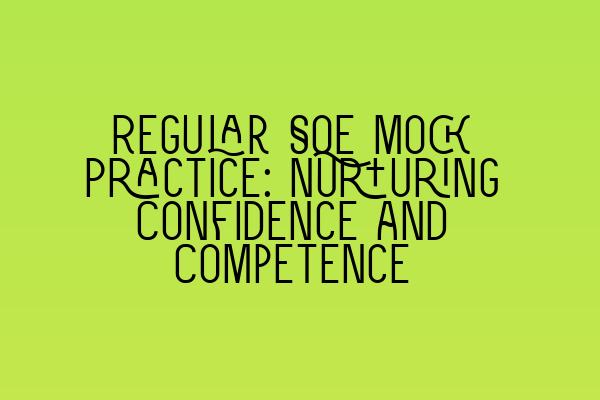Regular SQE Mock Practice: Nurturing Confidence and Competence
Preparing for the Solicitors Qualifying Examination (SQE) is a demanding process that requires diligent study and practical application of legal knowledge. Aspiring solicitors must not only have a solid understanding of the law but also the ability to apply it in real-world scenarios. This is where regular SQE mock practice comes into play, nurturing both confidence and competence in future solicitors.
What is SQE Mock Practice?
SQE mock practice involves simulating the examination conditions by creating mock exams that closely resemble the format and content of the actual SQE. These mock exams typically consist of multiple-choice questions, written scenarios, and practical case studies, allowing candidates to test their knowledge and skills in a controlled environment.
The purpose of SQE mock practice is twofold. Firstly, it helps candidates familiarize themselves with the examination format, time constraints, and question types. By regularly taking mock exams, candidates become comfortable with the structure and expectations of the SQE, reducing anxiety and improving performance on the actual exam day.
Secondly, SQE mock practice provides an opportunity for candidates to identify areas of weakness and refine their knowledge and understanding. Taking mock exams reveals knowledge gaps and allows candidates to focus their efforts on areas that need improvement. This targeted approach enhances overall competence and ensures that candidates are well-prepared for the challenges of the SQE.
The Benefits of Regular SQE Mock Practice
Regular SQE mock practice offers numerous benefits for aspiring solicitors. Let’s explore some of the key advantages:
- Identifying Knowledge Gaps: Mock exams help candidates identify areas where their knowledge may be lacking. This enables them to focus their revision efforts on these specific topics, ensuring a comprehensive understanding of the subject matter.
- Improving Time Management: The SQE is a time-pressured exam, and effective time management is crucial for success. Regular mock practice allows candidates to practice answering questions within the allocated time, helping them develop efficient exam techniques and strategies.
- Building Confidence: Mock exams instill a sense of familiarity and confidence in candidates. By regularly exposing themselves to exam conditions, they become more comfortable with the format and expectations, reducing anxiety and stress on the actual exam day.
- Enhancing Exam Technique: Each exam has its own unique style and requirements. By regularly practicing with mock exams, candidates can adapt their approach and develop effective strategies for tackling different question types, ensuring they are well-prepared for the demands of the SQE.
- Gaining Feedback: Mock exams provide valuable feedback on performance. Candidates can assess their strengths and weaknesses, enabling them to make necessary adjustments in their study approach. Additionally, receiving feedback from experienced professionals can further enhance their understanding and knowledge.
Integrating SQE Mock Practice into Study Routine
Regular SQE mock practice should be an integral part of every candidate’s study routine. By incorporating mock exams into their schedule, candidates can ensure they are continuously honing their skills and refining their knowledge.
Here are some tips for effectively integrating SQE mock practice into your study routine:
- Create a Mock Exam Schedule: Plan regular mock exams throughout your study period. Set specific dates and allocate sufficient time to simulate exam conditions. Treat these mock exams as seriously as the actual SQE to get the most accurate assessment of your progress.
- Use Reputable Mock Exam Resources: Seek out trustworthy SQE mock exam resources that closely mirror the format and content of the actual exam. These resources should offer a range of question types and case studies, enabling you to fully prepare for all aspects of the SQE.
- Analyze Your Performance: After each mock exam, thoroughly analyze your performance. Review your answers and identify areas where you made mistakes or encountered difficulty. Use this information to guide your revision and focus on areas that need improvement.
- Seek Professional Feedback: If possible, seek feedback from qualified professionals or tutors. Their expertise can provide valuable insights and constructive criticism that can significantly enhance your understanding and approach to the SQE.
In conclusion, regular SQE mock practice is an essential component of successful SQE preparation. By simulating exam conditions, identifying knowledge gaps, and refining exam techniques, candidates can nurture both their confidence and competence. Through consistent mock practice, aspiring solicitors can approach the actual SQE with a strong foundation and the necessary skills to excel.
If you’d like to explore more legal topics related to property practice and law, consider reading these related articles:
- Joint Ownership: Legal Considerations for Co-Owners of Property
- Commercial Leases: Essential Insights for Business Premises
- Tenant Rights in the UK: Understanding Your Legal Protections
- Property Transactions and the Legal Process: A Comprehensive Guide
- Examining the Intricacies of Land Law in the UK

Leave a Reply